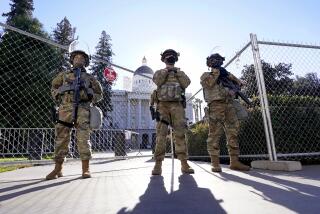Argentina Ousts Commander of Restive Base
BUENOS AIRES — The Argentine army Tuesday retired the general who commanded a restive garrison where a bomb was discovered last week during a visit by President Raul Alfonsin.
Gen. Anibal I. Verdura, saying farewell to his 3rd Corps troops in the interior city of Cordoba, insisted that no explosion had been planned. He said the bomb was “like a flashlight without batteries” and that it was intended “only to create a great scandal.”
A provincial policeman found the bomb inside the heavily guarded base on May 19 while Alfonsin was watching an artillery display nearby. There have been no arrests. Verdura told a Buenos Aires radio station that he is “absolutely certain” that none of his subordinates planted the device.
Known for Hostility
The government named Gen. Leopoldo Flores, the army’s ninth-ranking general, to replace Verdura at the base. The officer corps there is known for its hostility to the Alfonsin government.
There were widespread reports that several junior 3rd Corps officers were transferred to other bases around the country, but the army had no comment.
Reflecting the anger over the incident in civilian circles, the English-language Buenos Aires Herald chided the government for its “decidedly mild” reaction in allowing Verdura to resign without censure.
‘Undermining Confidence’
“The apparent ability of people in a military unit renowned for its indiscipline to get away with an attempt to assassinate the president is undermining public confidence in the government,” the Herald said in an editorial.
A federal judge Monday witnessed a re-creation of the incident in which police explosives experts set off the bomb.
On the same day, pamphlets criticizing the army commander, Gen. Hector Rios Erenu, were scattered from a speeding car outside the base.
The pamphlets, signed by a previously unknown group called Task Force 4, warned of “Marxist infiltration in organisms of security and intelligence.” They accused Rios Erenu of “compromising the prestige and the future of the army to intolerable limits through personal agreements with the leaders of Alfonsinism behind the army’s back.”
More to Read
Sign up for Essential California
The most important California stories and recommendations in your inbox every morning.
You may occasionally receive promotional content from the Los Angeles Times.










